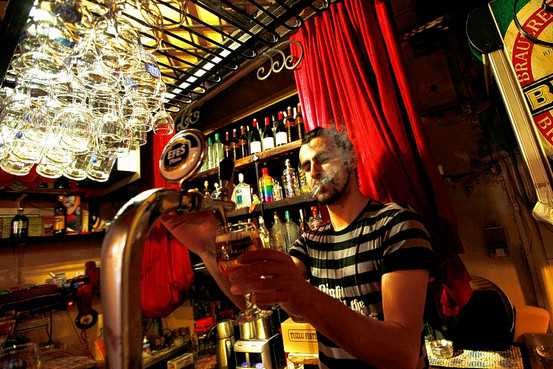By DANA MATTIOLI
With countries like Spain, Italy and Greece, where they traditionally sell alcohol, plagued by economic troubles, liquor-company executives are turning to a perhaps unlikely Mediterranean market: Turkey, whose mostly Muslim population hasn’t ranked among the world’s big drinkers historically.

Tapping nontraditional markets while established regions stagnate is a strategy that other industries are also pursuing, and the challenges that liquor makers face in Turkey echo the kinds of dilemmas that those industries confront as well.
Turkey, for instance, offers a fast-growing economy, but liquor companies must navigate high taxes, advertising restrictions, and a lack of familiarity among some consumers with the finer points of their products.
“In developed countries, consumers are much more familiar with products,” says Robert Furniss-Roe, vice president of Bacardi Ltd. “In these new, emerging economies you have to go back to basics in some ways and explain things.”
But the economics are alluring. Turkey’s economy grew about 10% in the second quarter compared with a year earlier, and its population is young and urban. The country’s economic growth is also providing young Turks with more disposable income, and they are using it to travel or study abroad, bringing back some new tastes.
“Young people in Turkey are changing very quickly,” says Mr. Furniss-Roe. “There’s growth in disposable income, and young Turks want to spend it on status.”
Still, Turkey presents hurdles. In October, its government introduced a 30% tax increase on alcohol makers on top of already high alcohol-consumption taxes. In response, alcohol-producer Pernod Ricard said it increased prices for key brands, including Chivas, Ballantines and Absolut, an average of 12%. Earlier, in 2008, Danish brewer Carlsberg closed its Turkish business partly in response to rising taxes.
In addition, during Ramadan—a monthlong religious observance during which Muslims abstain from eating, sexual relations and alcohol from dawn until sunset—Pernod’s operations in Turkey experience a 30% decline in sales, says Selcuk Tumay, general manager of Pernod Ricard Turkey.
Liquor makers also face a population of less-experienced drinkers who don’t always know how to use and mix different spirits. “It’s not easy to educate end-consumers because we aren’t allowed to advertise on the radio or television,” says Seyit Karagozoglu, president of the alcohol importing company in Istanbul that imports Patron tequila. Instead, companies rely on print advertising, much of which is instructional, and work with bartenders and restaurants to teach people about new drinks.
Nonetheless, alcohol makers are pouring in. In 2011, Bacardi plans to increase its marketing investment in Turkey 20% to 30% over five years, says Mr. Furniss-Roe. And Pernod Ricard is adding 15 people to its offices in Turkey this year, bringing the total to 75, with most new hires in marketing and sales.
So far, the expansion is paying off. Patron Spirits International’s business in Turkey is up 80% this year compared with last year, and its duty-free revenue in Istanbul increased 155% in the first half, says John McDonnell, chief operating officer of Patron Spirits International. Pernod’s most popular brands, such as Absolut, Chivas, Havana Club and Ballantines, grew 40% in Turkey in 2010, a company spokeswoman says.
To teach people about its drinks, Patron Spirits International promotes its tequilas partly by setting up four-to-eight-foot ice bars in hotels and trendy restaurants throughout the country. The ice bars, which last up to eight hours before melting, are manned by “mixologists” who dole out Patron samples and teach Turks how to blend cocktails.
Patron also works with hip restaurants and nightclubs through its Turkish distributor to teach waitresses and bartenders how to mix Patron drinks, such as Patron Sunrises, made with Patron tequila, orange juice and grenadine, says Seyit Karagozoglu, president of Patron’s Turkish distribution company.
Bacardi is also boosting efforts to teach bartenders how to mix popular drinks like mojitos and Cuba libres, says Mr. Furniss-Roe.
Party sponsorships are another way companies try to expose Turks to new drinks. Pernod is sponsoring eight nightclubs this year, up from five last year, enabling it to brand bars and other areas of the club and host events with Pernod drinks.
Pernod often sponsors parties with a signature drink like Jameson and ginger ale or Absolut cocktails for a few hours free of charge. The idea is to expose club goers to drinks they might not normally order in an effort to shape future drinking habits.
Cengiz Can, a 34-year-old e-commerce director who lives in Istanbul, says young Turks are turning away from raki, an anise-flavored alcohol that has long been popular in Turkey, because it’s “old fashioned.” Instead, he says, Turks are becoming image conscious, opting for drinks like vodka and tonic, or Bacardi or Jack Daniels and Coke, which he likes.
Mr. Can is a Muslim, but he drinks alcohol. “On paper I’m Muslim, but I respect all religions and thoughts and create my own rules,” he says.
Write to Dana Mattioli at [email protected]
via Liquor Companies Look to Tap Unlikely New Market: Turkey – WSJ.com.

Leave a Reply